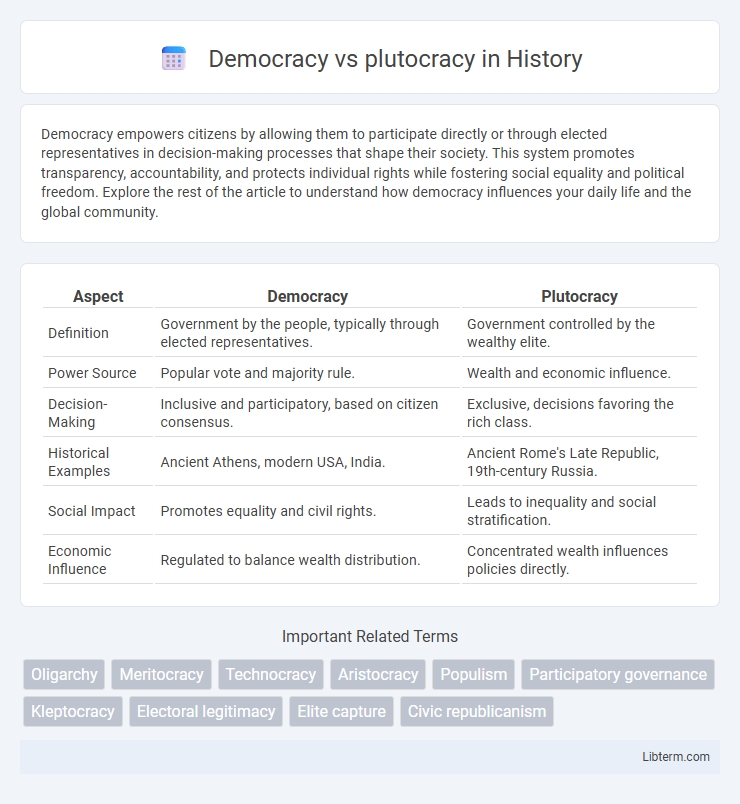Democracy empowers citizens by allowing them to participate directly or through elected representatives in decision-making processes that shape their society. This system promotes transparency, accountability, and protects individual rights while fostering social equality and political freedom. Explore the rest of the article to understand how democracy influences your daily life and the global community.
Table of Comparison
| Aspect | Democracy | Plutocracy |
|---|---|---|
| Definition | Government by the people, typically through elected representatives. | Government controlled by the wealthy elite. |
| Power Source | Popular vote and majority rule. | Wealth and economic influence. |
| Decision-Making | Inclusive and participatory, based on citizen consensus. | Exclusive, decisions favoring the rich class. |
| Historical Examples | Ancient Athens, modern USA, India. | Ancient Rome's Late Republic, 19th-century Russia. |
| Social Impact | Promotes equality and civil rights. | Leads to inequality and social stratification. |
| Economic Influence | Regulated to balance wealth distribution. | Concentrated wealth influences policies directly. |
Understanding Democracy: Principles and Practices
Democracy operates on principles of political equality, where citizens have equal voting rights and the power to influence government decisions through free and fair elections. Democratic practices include transparency, accountability, and the protection of individual freedoms to ensure government actions reflect the public will. This system contrasts with plutocracy, where wealth dictates political power, undermining democratic ideals of equal participation and representation.
What Is Plutocracy? Definition and Key Features
Plutocracy is a form of government where power is concentrated in the hands of the wealthy elite, influencing political decisions primarily through economic means. Key features include control of political authority by individuals or groups possessing vast financial resources, limited public influence, and policy preferences that often favor wealth preservation and accumulation. Unlike democracy, where power is derived from equal citizen participation, plutocracy prioritizes monetary influence and economic dominance in governance.
Historical Evolution of Democracy and Plutocracy
Democracy originated in ancient Athens around the 5th century BCE, emphasizing citizen participation and equal voting rights, while plutocracy emerged as rule by the wealthy elite controlling economic resources and political power. Throughout history, democratic ideals expanded with the Enlightenment and revolutions in America and France, challenging aristocratic and plutocratic dominance. In contrast, plutocracy often persisted through oligarchic structures and economic influence, shaping policy decisions to favor the affluent, reflecting a continuous tension between popular sovereignty and wealth-based governance.
Key Differences Between Democracy and Plutocracy
Democracy is a political system where power is vested in the hands of the citizens through equal voting rights and majority rule, promoting political equality and participation. Plutocracy, by contrast, concentrates power in the hands of the wealthy elite, where economic influence dictates political control, often leading to policies favoring the rich. Key differences include decision-making authority, with democracy emphasizing inclusivity and representation, while plutocracy prioritizes financial power and elite interests.
How Power Is Distributed in Democracies vs Plutocracies
In democracies, power is distributed broadly among citizens through free and fair elections, ensuring that government authority reflects the majority's will and promotes political equality. In contrast, plutocracies concentrate power in the hands of the wealthy elite, where economic influence directly shapes policy decisions and governance, often marginalizing the interests of the general population. This fundamental difference in power distribution affects policy outcomes, social equity, and the responsiveness of institutions to everyday citizens versus affluent groups.
Impact on Economic Equality and Wealth Distribution
Democracy tends to promote greater economic equality and more equitable wealth distribution through policies that support progressive taxation, social welfare programs, and labor rights. Plutocracy often leads to significant wealth concentration as economic power influences political decisions, resulting in policies that favor the wealthy elite and reduce social mobility. The disparity between these systems is evident in income inequality metrics and access to resources, where democracies generally exhibit lower Gini coefficients compared to plutocratic regimes.
Political Influence: Citizens vs Elites
Democracy empowers citizens with equal political influence through voting rights, public participation, and accountability mechanisms, ensuring government actions reflect the majority's will. Plutocracy, however, concentrates political power in the hands of wealthy elites whose financial resources heavily sway policy decisions and electoral outcomes. This disparity creates a systemic imbalance where elite interests often override the preferences of the broader population.
Case Studies: Democratic and Plutocratic Systems in History
Ancient Athens exemplifies a direct democracy where citizens participated in decision-making, promoting political equality and civic engagement. In contrast, the Roman Republic evolved into a plutocracy as wealthy elites dominated political power, leveraging economic influence to control legislation. Modern examples include the United States, where campaign finance and lobbying highlight plutocratic tendencies within a formally democratic framework.
Challenges and Criticisms of Each System
Democracy faces challenges such as the risk of majority tyranny, political polarization, and the influence of misinformation undermining informed voter decisions. Plutocracy is criticized for perpetuating economic inequality, concentrating power among wealthy elites who prioritize their interests over public welfare, and limiting social mobility. Both systems grapple with accountability issues, where elected officials or wealthy power brokers may act in self-interest rather than representing the broader population.
The Future of Governance: Democracy or Plutocracy?
The future of governance hinges on the balance between democracy's emphasis on equal political participation and plutocracy's concentration of power among the wealthy elite. As economic inequality intensifies globally, plutocratic tendencies threaten democratic institutions by skewing policy influence toward affluent interests. Sustaining robust democratic governance requires reinforcing transparency, accountability, and inclusive political engagement to prevent oligarchic dominance and ensure equitable representation.
Democracy Infographic

 libterm.com
libterm.com